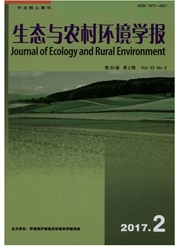

 中文摘要:
中文摘要:
农户既是农村生活垃圾污染的制造者和受害者,同时也是污染治理的主要受益者,这一多重身份使得研究农户参与生活垃圾集中处理的行为机理具有重要意义。基于福建省270位农户的调查数据,利用层次回归模型分析农村生活垃圾集中处理中农户心理认知与其行为响应的关系,并引入治理情境作为调节变量,分析治理情境对农户的心理认知一处理行为关系的调节效应。研究结果表明:(1)农村生活垃圾处理中农户的行为态度对其垃圾分类、处理费支付以及定点倾倒行为均具有显著的正向影响,而主观规范仅对垃圾处理费支付与定点倾倒等集体性质行为具有显著正向影响。(2)治理情境因素中的生活垃圾处理设施清理频率在农户心理认知与3类处理行为之间均起到正向调节作用,农户住房到垃圾处理设施距离对处理费支付行为和定点倾倒行为具有显著负向调节作用,而对垃圾分类行为具有显著正向调节作用。生活垃圾收集设施数量对处理费支付行为和定点倾倒行为具有正向调节作用,对生活垃圾分类行为不具有调节作用。
 英文摘要:
英文摘要:
Farmers are not only the makers, but also the victims of rural domestic refuse pollution, as well as the main beneficiaries of governance of the pollution. So, it is important and meaningful to farmers multiple in status to study behavioral mechanism of the farmers participating in centralized disposal of rural domestic refuse. Therefore, analysis was done of the survey data of 270 farmer households in Fujian Province, using the Hierarchical Regression Model for relationship between psychological cognition and behaviors of the farmers involved in centralized disposal of rural domestic refuse, and with governance situation introduced as regulatory variable, analysis was further done of effect of governance situation regulating the relationship between psychological cognition and disposal behaviors of the farmers. Results show: ( 1 ) Attitude of the farmers towards centralized disposal of rural domestic refuse has a significantly positive effect on the farmers' behaviors in sorting refuse, paying for refuse disposal and dumping at assigned sites; while subjective standardization does only on the latter 2 items; (2) Among the factors of governance situation, cleaning frequency of domestic refuse disposal facilities has a positive effect on farmers' psychological cognition and refuse disposal behaviors, while the distance between the farmers houses and the refuse treatment facilities has a significantly negative effect on payment of refuse disposal fees and dumping at a designated site, but a positive one on sorting of refuse. In addition, the number of domestic refuse collection facilities has a positive regulatory effect on payment of refuse disposal fees and dumping at designated sites, but no regulatory effect on sorting of domestic refuse.
 同期刊论文项目
同期刊论文项目
 同项目期刊论文
同项目期刊论文
 期刊信息
期刊信息
